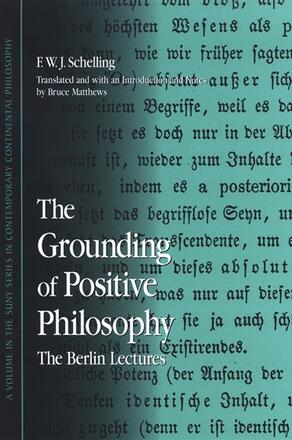
The Grounding of Positive Philosophy
The Berlin Lectures
Alternative formats available from:
The first English translation of Schelling’s final “existential system.”
Description
The Berlin lectures in The Grounding of Positive Philosophy, appearing here for the first time in English, advance Schelling's final "existential system" as an alternative to modernity's reduction of philosophy to a purely formal science of reason. The onetime protégé of Fichte and benefactor of Hegel, Schelling accuses German Idealism of dealing "with the world of lived experience just as a surgeon who promises to cure your ailing leg by amputating it." Schelling's appeal in Berlin for a positive, existential philosophy found an interested audience in Kierkegaard, Engels, Feuerbach, Marx, and Bakunin. His account of the ecstatic nature of existence and reason proved to be decisive for the work of Paul Tillich and Martin Heidegger. Also, Schelling's critique of reason's quixotic attempt at self-grounding anticipates similar criticisms leveled by poststructuralism, but without sacrificing philosophy's power to provide a positive account of truth and meaning. The Berlin lectures provide fascinating insight into the thought processes of one of the most provocative yet least understood thinkers of nineteenth-century German philosophy.
Bruce Matthews is Assistant Professor of Philosophy at Bard High School Early College.
Reviews
"Despite a strong resurgence of interest in his philosophy, Schelling's final Berlin lectures have remained unavailable to English-reading audiences. At long last, in Bruce Matthews's able hands, this lacuna has been remedied. This is a strong and rigorous translation of the inaugural lectures, which, along with Matthews's compelling and informative introduction, not only provides readers with a taste of these remarkable and unduly neglected lecture courses, but also provides an overview of Schelling's final project of positive philosophy and philosophical religion. These lectures are critical to a full appreciation of Schelling's accomplishments." — Jason M. Wirth, author of The Conspiracy of Life: Meditations on Schelling and His Time
"With the publication of this translation, the last significant barrier to the reception of Schelling by the English-speaking philosophical community has been removed. As Bruce Matthews shows in his powerful introductory essay, Schelling's philosophical confrontation with Kant and Hegel gave birth to an utterly new and independent way of doing philosophy, one grounded not in the concept but in the intuition of existence itself." — Joseph P. Lawrence, College of the Holy Cross